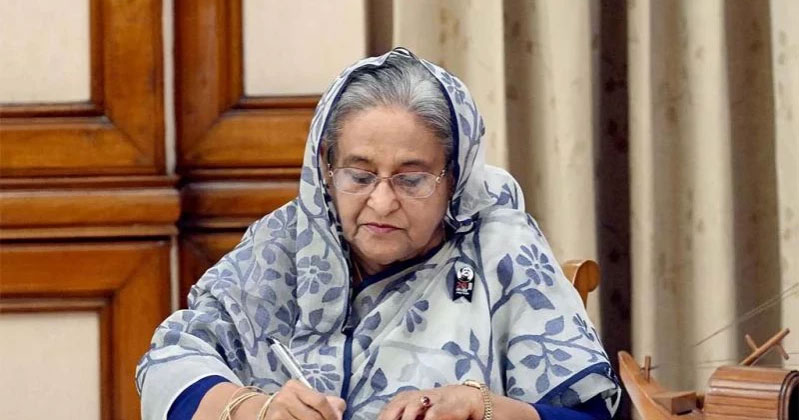Sheikh Hasina’s rise and fall: A timeline
Staff Correspondent: The political journey of Sheikh Hasina, one of Bangladesh’s most prominent leaders, has been marked by significant highs and dramatic lows.
Born on September 28, 1947, Sheikh Hasina began her political journey as a student leader. She was elected Vice President of the Students Union at Eden College between 1966 and 1967 and later became the General Secretary of the women’s unit at Dhaka University’s Rokeya Hall. These early experiences laid the foundation for her future political career.
On August 15, 1975, tragedy struck when her father, Bangabandhu Sheikh Mujibur Rahman, and other family members were assassinated. At the time, Sheikh Hasina and her sister Sheikh Rehana were in West Germany. They accepted political asylum in India, offered by then-Prime Minister Indira Gandhi, and lived in New Delhi for six years.
After being elected President of the Awami League on February 16, 1981, Sheikh Hasina returned to Bangladesh on May 17, 1981. Her return marked the beginning of a new chapter in her political career, characterized by both struggle and perseverance.
Throughout the 1980s, Sheikh Hasina faced repeated detentions under martial law. She was placed under house arrest in February and November 1984, and again in March 1985 for another three months. Despite these challenges, she continued to fight for democracy and justice.
In 1986, Hasina and the Awami League participated in the general election under President Hussain Muhammad Ershad, where she served as the leader of the parliamentary opposition. She led an eight-party alliance against Ershad’s regime, demanding fair elections and democratic reforms.
As the political landscape of Bangladesh became increasingly volatile, Hasina’s leadership was put to the test. In December 1987, Ershad dissolved parliament, prompting mass uprisings in Dhaka. The protests resulted in several deaths, including that of Awami League activist Noor Hossain.
Sheikh Hasina’s resilience paid off when she became Prime Minister in 1996 after winning the general election. Her tenure lasted until 2001.
During the 2006–2008 political crisis, Hasina was detained on extortion charges, a move seen by many as politically motivated. Despite these challenges, she won the 2008 election, solidifying her position as a key political figure.
In 2014, Hasina was re-elected for a third term in an election boycotted by the opposition BNP, raising questions about the legitimacy of her government. Nevertheless, she continued to lead the country and won her fourth term after the 2018 election.
In 2024, Sheikh Hasina secured her fifth term as Prime Minister, making her the world’s longest-serving female head of government. However, her final term was marred by controversy and violence.
Around 300 people (unofficially more) lost their lives in Bangladesh due to violent protests stemming from the controversial quota system for government jobs. Anti-government demonstrators marched into Dhaka on Monday following a weekend of intense violence that claimed over 90 lives.
Protesters were demanding the resignation of Prime Minister Sheikh Hasina and justice for those killed during the clashes. The protests escalated on July 16 when clashes between security forces and pro-government activists and students turned violent. The Supreme Court intervened to roll back the quota decision, but the unrest continued.
A renewed wave of anti-government demonstrations over the weekend saw violent clashes reignite, drawing hundreds of thousands of protesters and further destabilizing the nation.
Sheikh Hasina resigned from her position on August 5, 2024. Shortly after her resignation, Hasina, accompanied by her sister Sheikh Rehana, left Dhaka via helicopter, landing in Agartala, the capital of the Indian state of Tripura, according to Indian media reports.
In the wake of Hasina’s resignation, Bangladesh Army Chief General Waker-Uz-Zaman announced plans to form an interim government.
Rare Israeli airstrike in Beirut kills Hezbollah commander and more than a dozen others
International Desk: Israel launched a rare airstrike that killed a senior Hezbollah milita…








